- Home
- Peter Carey
Bliss Page 27
Bliss Read online
Page 27
Days later Honey Barbara knew that something had hap-pened, but she never ever guessed that it was Annette Horses' old story about the amphetamines which had caused it. After all, it was only one of the stories in the great repertoire of drug-paranoia stories, which were all a little too real to have any romantic interest for her.
Annette Horses, and therefore Honey Barbara, always ended the story with the claim that she was the only person in the world (only person in the world not in jail) who knew where these drugs were. Yet it was not avarice that made David change his mind about her – he had lived in Palm Avenue long enough to know that a good story always had a little extra romance than real life. ('Every good story should always have at least one tower in it,' Vance Joy had said and, typically, having made the rule to suit a story about a tower, abandoned it in the desert, a puzzling shard that was polished and cared for by his descendants.)
So slowly that it was not at first remarked on, David Joy became polite to Honey Barbara and, once polite, helpful. He helped her to wash dishes and even, on one occasion, weed the vegetable garden, although he loathed the dry too-smooth feeling that settled on his dirty hands and he retired as soon as was politely possible to wash them and rub them with Bettina's Oil of Ulay. He did not go for walks with her like Harry did, or brush (suggestively) past her like Joel did, and he was certainly far too inhibited to ask for Kissing Rights. But he did, in his strange tight whisky voice, talk to Honey Barbara here and there and, at certain quiet times when the others were busy, make some confessions of his plans, his ideas about South America.
She had not discouraged his dreams. Better, she thought, that he got out of that job and actually did something.
He showed her selected sections of his dreams and she saw something black and glistening like oil, but not without beauty. While Joel looked at television she and David some-times looked at the atlas together and she felt pleased that he liked her, for he had seemed so cramped, so tense, so unnatural that she thought about him in the way she thought about Bonsai trees which she always ached to liberate: to gently break their pots, unbind their roots, to take them back into the bush and let them grow. Her pride was that she was good with living things and she liked to see David Joy smile and she was proud to see him become calmer and more confident. At least, she thought, she could do something good at Palm Avenue, and tonight just when everything was so bleak he came and gave her a beautiful handkerchief made from yellow silk.
She lay on her stomach and he touched the muscles around her neck. 'Knotted,' he said softly.
He began to massage them and she was surprised, first that he touched her at all, and second that he massaged her well.
'I did what you said,' he said. 'I went to the workshop at the Zen Inn'.
She felt his fingers breaking up the knots and smiled. She had taught him things he had begun by ridiculing, and she smiled that he had done these things in his secret way, and imagined how they would have handled him in the workshop, seeing him there in his shiny black shoes and expensive grey cardigan.
In her most paranoid moment she would never have imagined that David Joy had mentally rehearsed this moment for the last month, had nightly run over it in his mind, had taken the massage course for this, and only this, reason and moment. He had watched her with a cunning, a furtiveness that, to him, in no way contradicted the feeling of his heart. He had observed her slow collapse and had managed to at once welcome it-and disapprove of Harry for causing it.
'I'll have to sit up here. O.K.'
'O.K.'
He massaged her back, working her spine through her singlet and she was the one who took it off. He went quickly to his room for oil. He massaged beautifully, with great sensitivity, and understood the importance of an uninterrupted stroke as he drew all the tension from her shoulders out through her fingertips.
When he turned her over, her eyes were shut and he gasped, privately behind his frozen face, to see the beauty of her breasts.
'Take your baggies off.'
'I haven't got any other pants on.'
'It's O.K.'
She must have suspected that it right not be O.K., that he right have changed a little, but he had not changed that much, and he was still the same dark-eyed, furtive, inhibited boy who had begun by despising her and wanting her removed; but she was a sucker for massage and he had learnt his lessons well. He did her legs and then her arms and her neck and her stomach, and her breasts and she did not even know by then it was not O.K., but when he worked the fleshy mound of his palms between the petal lips of her vulva her wetness smeared his hand and gave the lie to it.
He had so many dreams, so many fantasies, revenges, loves, schemes, hopes, impossible Eldorados that when he felt this perfumed smear he was awash with emotions and his limbs felt so weak that he fell over trying to remove his clothes.
His body was surprisingly hard but also lithe like a snake in its sinuous movements and she took him into her with a sound which could have been heard as either a whimper or a sigh.
Through all the lovemaking her eyes were shut, and what-ever she saw or thought she kept secret from herself. She felt him quiver and come before she was ready, but he did not stop thrusting and it was then she looked up into the eyes and saw specks of brown, almost gold, gleaming like cats' eyes in sunlight. He asked so desperately for her pleasure that she acted it for him and she dug her hands hard into his back and gave him, in a place that would not show, a bite that would glow sullenly for weeks.
Then she saw – just as, in a milling crowd, one might see a flash of a knife moving from pocket to pocket, just a glimpse the small glint as it catches the sun – a look in his eyes. It was triumph, a cold hard thing, like a spring on the lid of a box. She understood in an instant, that she was a dream he had caught in a net.
Damn you and your dreams. She carefully wiped his penis with the yellow handkerchief then placed the damp silk between her legs lest the marks of her infidelity show on the eiderdown.
She had come to this, this seedy betrayal, and she knew it was time to leave these people, who had such trunk-loads of dreams, ideas and ambitions but never anything in the present, only what would happen one day, and it was time to get away from it and face whatever might be waiting for her at home and hope that it might be as it had been: better and deeper pleasures with smaller, more ordinary things, pleasures so everyday that these people would never see anything in them but tiredness, repetition, discomfort, and no originality at all. The light in the room had always been bad, a sad little twenty-five-watt globe which produced an unrelieved cast of middle grey, from which nothing stood out except the tip of a yellow handkerchief which would, in a happier moment, have looked like the fallen petal of a jonquil between her legs.
It had stopped raining but, at three in the afternoon on that day in the unimagined future, a low mist still hung around the sides of the mountains and when David Joy descended from his truck he was careful not to muddy his suit. He lit a long thin cigar, and, when he put his matches back in his pocket, left his hand there with them.
The truck was just beyond the bridge where tourists took photographs and where truck drivers went to defecate. They had been stopped by the army on the Armenia side of the bridge and his passenger, the modest, infuriating man with the broad-shouldered shrug and the dark shadow on his face, had been shot dead as he ran towards the shelter of the round tanks, which turned out (Fabricá de Sulfato Amontaco) to be a fertilizer factory.
The local newspaper came out to take photographs of the man where he lay with his face in a puddle. The Major was too proud to indulge in any of this tomfoolery and when he spoke to the reporter he adopted a haughty air. His name was Major Miguel Fernandez. He was thirty-three years old. He had olive skin, a small mouth with unusually well-defined bow-shaped lips and hooded, soulful eyes. He walked with a slump of the shoulders, not a defeated slump, but the disguise of an athletic man who wishes, for some reason, to disclaim any special prowess. His love was not the army.
His love was the literature of England.
'Now,' he said, 'perhaps we might go and drink coffee. Then we can discuss this.'
Together they dodged the puddles.
It was a modern cafe built by its German owner to take money from the truck drivers and the bus passengers and in this he had been quite successful. He was a thin dried-out walnut of a man, who sat, in his white apron, on a special perch he had built for himself and his cash register. Here he spiked the bills, gave change, and surveyed the white and gold speckled floor, the neon lights (three different colours), the jet black laminex tables, the pinball machines and, through a system of mirrors, could check on anyone who might be considering leaving without paying.
But when David Joy and the Major entered his establish-ment he descended from his pulpit and, with a rare smile, escorted them personally to a booth at the window.
Miguel Fernandez sat where he could watch his men unload the truck. He was beguiled by what he saw as David Joy's Englishness. He liked the cool way he had climbed from his truck and lit his cigar, not exactly like David Niven, but like somebody, somebody English. He asked him questions about his place of birth, date of arrival in Colombia, papers and so on, but he managed to do it as one man of culture addressing another, and so supplied details of his own education and family history. But when he saw one of his men hold up machine guns from a crate, his stomach tightened, because there were simple orders to be carried out in circumstances such as these (officially a state of emergency) and he no longer had the appetite for them. In a year he would be out of the army. He would open a bookshop near the university at Medelin and sell Stevenson in translation but also in English.
'Mr Joy, what were you carrying in your truck?'
'Motor-cycle parts.'
'If I told you they were guns, not motor-cycle parts?'
David Joy sipped his coffee. 'I took the job,' he said, 'like any other. I can't spend my time opening crates.'
Miguel Fernandez nodded in encouragement. 'And he gave you money. You gave him a receipt perhaps.'
'No, he gave me no money.'
'It could be most important to you, Mr Joy, that he gave you money.'
David Joy was not unaware of the respect being accorded him. He drew it into himself. He felt slow and lazy and he answered after a yawn. 'He was to give me the money later,' he smiled. 'When the parts were delivered.' He felt no fear, none at all. His head was perfectly clear, perhaps exaggeratedly clear, as if he was under the influence of a mild hallucinogen.
'But he had money.' Miguel Fernandez had small pink-nailed hands which he had the habit of playing with, bringing the fingertips together, then twisting them on an imaginary axis and so on. It would have been a more acceptable habit, David Joy thought, in someone with longer fingers.
'I trusted him,' David said, edging out further on some imaginary tightrope.
'No,' the Major said sadly, 'you did not trust him. You do not drive for ten hours for a poor man who says he will pay you later.'
David signalled the waiter for more coffee. The movement of his hand conveyed perfect authority.
'If you are a businessman, you take money. You are a con-tractor. Perhaps the receipt has slipped your mind. Perhaps he paid you and you kept the receipt in your book.'
'No,' David Joy smiled. (This is not ordinary. I am not ordinary.) 'I have no receipt.'
'But you are not a Communist.'
'Do I look like a Communist?' Now, in captivity, he felt freer than he had ever felt. '
'Then in God's name write a receipt, Mr Joy.'
'I cannot write a receipt because the man gave me no money.'
'Then you are a Communist,'
'You know I am not a Communist. The man asked me to carry goods for him.'
'You are a very stupid man. Stay here.'
David Joy was left alone at the table where he took pleasure in observing himself.
Major Fernandez was talking to Bogotá on the telephone. The line was bad. He pleaded for David Joy's life while David Joy sat by the window smoking a long thin cigar and drinking black coffee. Children came and stood in the doorway. He smiled at them and they hid. It was like a dream and it was, in some way, perfect. It was not the disgrace with the two knife-wielding spivs who had sent him scurrying back to the safety of his waiter's uniform. Everything he did was elegant, and proud. His movements were, just so. He lit another cigar with a flourish.
When the Major returned, David Joy observed the exotic nature of his uniform, the romantic quality of his face, his refined movements, the crumpled packet of cigarettes he placed on the table. It was like a film. It was as if he had never been in Colombia and had been dumped, just now, into this seat.
'You are trying to make me kill you,' the Major said. 'It would be simpler for you to just jump off the bridge.'
David bowed his head and smiled. He appreciated the style of the Major's comment. He 'offered him a cigar and was pleasantly surprised when he accepted it.
'You have my word I am not a Communist.' The Major looked at him with renewed hope. 'You did not know about the guns?' For a moment David allowed himself to despise the man's pleading eyes.
'I guessed,' he said, 'yes.'
'I am not going to shoot you,' Major Fernandez told him, 'no matter how much you desire me to.' And the rules of the game were thus, finally, stated.
Night came and they were still there. The soldiers crowded into the cafe and sat at the tables drinking coffee and playing cards. The German looked unhappy but did not complain. It appeared however that none of this was bad for business at all. Quite the opposite. Locals came to see the man in the white suit and they, of course, bought coffee and one or two purchased cigarettes. When the Major talked to Bogotá (who would pay?) the cafe went quiet as they listened to him plead for the life of the man in the white suit. The foreigner, the Major said, was not a Communist. He was a madman. He should be deported, perhaps, or locked up in an asylum, but not shot.
David Joy bought wine for the soldiers. The soldiers passed the bottles to the people from the town. David bought more wine. The German did not smile but his pen was kept busy and occasionally, behind the' shelter of a ledger, he took out a small electronic calculator and fiddled with it before returning it to its place.
Major Fernandez was trying to communicate the essential quality of David Joy to the blockheads in Bogotá but he was only making a fool of himself doing it. He had family in the military. He irritated valuable contacts throughout the night trying to save David Joy, who played cards with the soldiers, danced (once, but to much applause) with a girl from the town, and answered questions which were translated back and forth by a throaty-voiced fifteen-year-old boy.
'Aren't you afraid?' they asked him.
'I was born in a lightning storm,' he said.
A woman gave him a shawl to sit on in case the cafe chairs should soil his suit. He accepted it graciously, as his due. In return he told them stories which were translated a sentence at a time.
At about three o'dock in the morning Miguel Fernandez joined the table, a glass of wine in his hand, his uniform unbuttoned.
'David,' he said, 'you will only have to say where you were taking the guns.' He was smiling, 'That is all.'
Some of the townspeople had gone home. But the fifteen-year-old boy was still awake to translate this for the audience. They waited. They looked at David Joy, their laughter ready, like pigeons, to fly around the room.
'No,' David Joy said.
'Non,' the fifteen-year-old translated needlessly.
They did not know that he could not have provided the information anyway. But even if he had known it is doubtful if he would have weakened. He could not soil the perfection of this, this pure white perfect thing. The only perfect thing.
It is likely that the audience would have stayed to the bitter end, trooped out into the cold dawn and gone down under the bridge where the execution was to be carried out. But the Major cleared them out in a fury, screaming abuse at
them.
'Carrion,' he told them, 'vermin. Go before it is too late.'
So when the time came there was only the German to join the procession and he locked the cafe before following the party down the muddy embankment. It occurred to him, watching the Major and the man in the white suit, that it was the Major who looked as if he would be shot and the other who would do the shooting.
It was cold. David's balls retracted into his stomach and he knew his scrotum was a tough tight little purse. He wanted a piss. Would he piss himself after he died, as he died? He shivered. He stopped and turned his back to piss. The party halted. The men watched him. His penis had shrivelled in the cold. He turned his back because he did not want them to doubt his manhood. He watched the steam rise as his warm urine hit the ground. He felt like he had as a child on Sunday nights watching the highway full of cars returning home after a weekend.
He was not frightened at all. There had been no fear since the episode started. It had all been so easy. If he had known it would be this easy he would not have worried about it.
He was more distressed when, going down the embankment, he slipped and muddied the back of his suit.
'Fuck,' he said.
But when he saw Miguel Fernandez's sick melancholy face it relieved him even of that pain.
'Cheer up,' he told him, and felt again some of the bravado he had felt in the warm of the cafe with the soldiers gathered around him and the jukebox playing and that girl he had danced with, he had missed her name. 'Cheer up, Miguel. You can have a big breakfast.'
'You're a fool,' the Major said bitterly.
'Possibly.'
'It is unnecessary. Please, David... '
For a moment he hesitated. For an instant panic fluttered its wings in his ears.

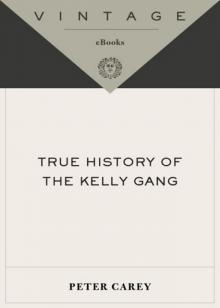 True History of the Kelly Gang
True History of the Kelly Gang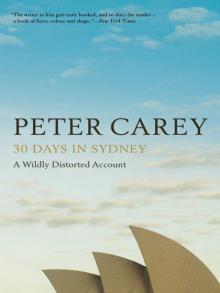 30 Days in Sydney: A Wildly Distorted Account
30 Days in Sydney: A Wildly Distorted Account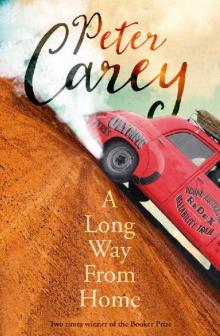 A Long Way From Home
A Long Way From Home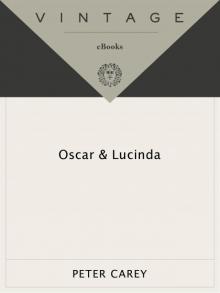 Oscar and Lucinda
Oscar and Lucinda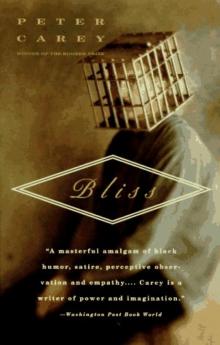 Bliss
Bliss Wrong About Japan
Wrong About Japan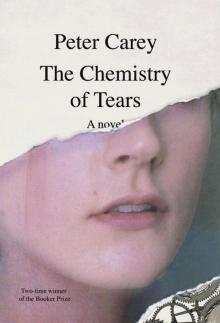 The Chemistry of Tears
The Chemistry of Tears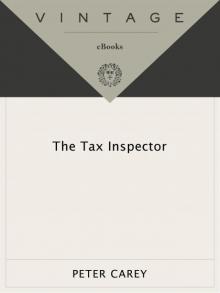 The Tax Inspector
The Tax Inspector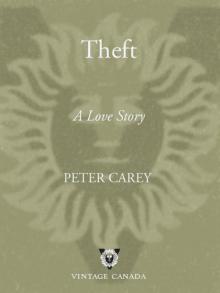 Theft: A Love Story
Theft: A Love Story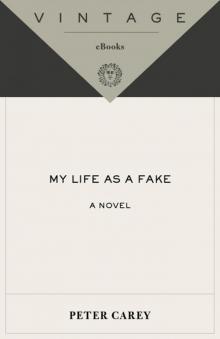 My Life as a Fake
My Life as a Fake Collected Stories
Collected Stories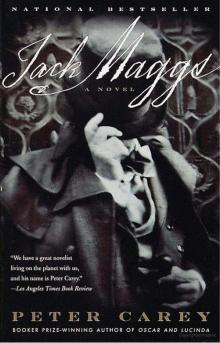 Jack Maggs
Jack Maggs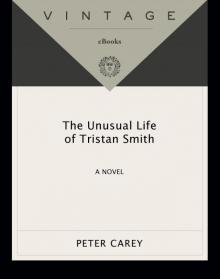 The Unusual Life of Tristan Smith
The Unusual Life of Tristan Smith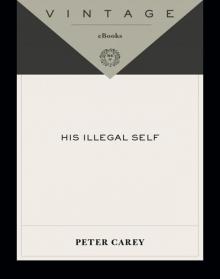 His Illegal Self His Illegal Self His Illegal Self
His Illegal Self His Illegal Self His Illegal Self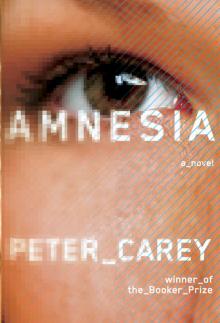 Amnesia: A Novel
Amnesia: A Novel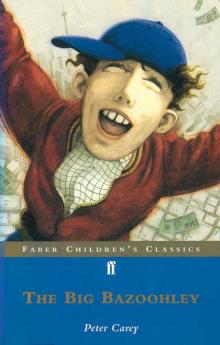 The Big Bazoohley
The Big Bazoohley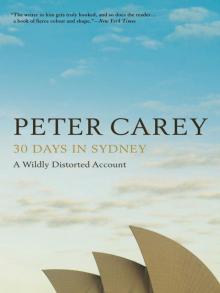 30 Days in Sydney
30 Days in Sydney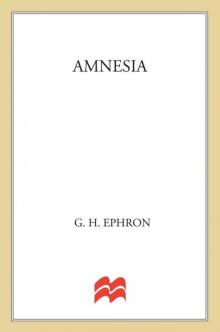 Amnesia
Amnesia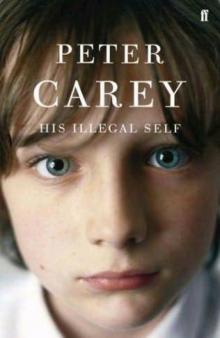 His Illegal Self
His Illegal Self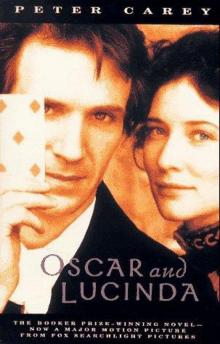 Oscar and Lucinda bw-1988
Oscar and Lucinda bw-1988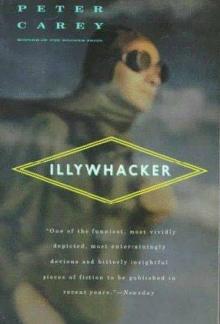 Illywhacker
Illywhacker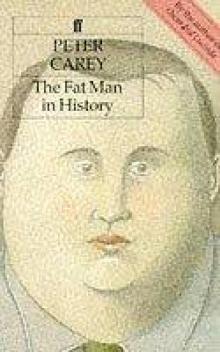 The Fat Man in History aka Exotic Pleasures
The Fat Man in History aka Exotic Pleasures